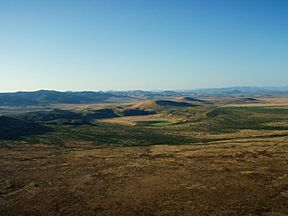San Bernardino Valley (Arizona) facts for kids
Quick facts for kids San Bernardino Valley |
|
|---|---|

Paramore Crater
|
|
| Length | 35 mi (56 km) NE x SW |
| Width | 12 mi (19 km) |
| Geography | |
| Country | United States |
| State | Arizona |
| Regions | Sonoran Desert and Chihuahua Desert |
| Counties | Cochise County, Arizona and Hidalgo County, New Mexico |
| Communities | Chiricahua, AZ and Bernardino, AZ (historical site) |
| Borders on |
List
|
The San Bernardino Valley in Arizona is a long valley. It stretches about 35 miles (56 km) from northeast to southwest. You can find it in the very southeast part of Cochise County, Arizona.
To the north, it connects with the San Simon Valley. Both valleys meet near the western edge of Hidalgo County, New Mexico. This valley is a special type of sunken land called a "graben." This means it formed when the land dropped down between two faults.
The San Bernardino Valley is surrounded by mountains and other valleys. It sits southeast of the Chiricahua Mountains. The Peloncillo Mountains of New Mexico are to its east. South of those are the smaller Guadalupe Mountains.
To the south, the valley reaches the border of Sonora, Mexico. It is also near the northern parts of Mexico's Sierra del Tigre mountain range. The San Bernardino River flows here and joins the Bavispe River, heading south into Mexico. To the northwest and west, the valley touches the Chiricahua Mountains, Pedregosa, and Perilla Mountains.
At the very south of the valley, near Douglas, Arizona and Agua Prieta, Mexico, is the San Bernardino National Wildlife Refuge. This refuge has grasslands and wetlands. It is part of the Yaqui River system, which flows south and southwest through Mexico to the Gulf of California.
Volcanoes and Lava in the Valley
The floor of the San Bernardino Valley is covered by ancient lava. This lava is made of a rock called basalt. It came from volcanoes that erupted between 0.27 and 1 million years ago. This area is part of a larger volcanic region known as the Boot Heel volcanic field.
This volcanic area covers about 850 square kilometers (328 square miles). It has many features from past eruptions. You can find lava flows made of olivine basalt. There are also tuff rings, which are flat, wide craters formed by explosive eruptions. Maars are similar, but they are usually filled with water. The area also has over 130 identified volcanic vents and cinder cones. Cinder cones are cone-shaped hills made of volcanic ash and rock fragments.
See also
 In Spanish: Valle de San Bernardino (Arizona) para niños
In Spanish: Valle de San Bernardino (Arizona) para niños


